Facing both climate change and high fuel costs, reducing energy consumption is on everyone’s mind. So it’s exciting to hear that institutional organizations are contributing to this goal by researching and implementing technical solutions.
Enter Spencer Wilson, BCIT Computer Systems Technology (CST) Bachelor of Technology (BTech) student and prior CST Diploma graduate, who spent last summer helping research possible improvements to heating and cooling efficiency on BCIT’s Burnaby campus.
Spencer was working with Dr. Sirine Maalej, Faculty in Mechanical Engineering, and Dr. Aaron Hunter, Faculty in Computing. Sirine researches the use of Artificial Intelligence (AI) for Heating, Ventilation, and Air Conditioning (HVAC) optimization, and Aaron works in AI and information security. Aaron was able to bring Spencer into the project as a Natural Sciences and Engineering Research Council of Canada (NSERC) Undergraduate Summer Research Assistant.
“my BCIT education prepared me by teaching me how to learn quickly” – Spencer Wilson
A quarter of emissions come from buildings
While emissions talk is often focused on transportation or food systems, Metro Vancouver estimates that emissions from buildings are significant, representing approximately 25% of all regional greenhouse gas emissions.
BCIT’s current mechanism for heating and cooling is mainly set up to alternate between day time/occupied and night time/unoccupied settings. “But this means we are potentially wasting energy heating or cooling empty classrooms and lecture halls, since they’re not always occupied during those times,” says Sirine.
“Our paper, Increasing the Efficiency of HVAC Systems Using Schedule-Based Control, explores the effectiveness of using classroom timetables as a data source for occupancy for manipulation and control of HVAC systems,” explains Spencer. “As part of our research, we implemented our solution in three different buildings at BCIT, and it significantly reduced the HVAC usage and energy consumption.”
“Our solution is low-cost, yet innovative, and efficient,” says Sirine.
“This was a nice example of interdisciplinary research at BCIT – we have a Computing student working with a Mechanical Engineering instructor to solve an important practical problem,” adds Aaron. “The project also involved BCIT Campus Planning and Facilities. They were highly collaborative and they were very motivated to explore innovative approaches to meeting our sustainability goals. It was great that they let us pilot a new HVAC schedule in real classrooms over the summer.”
“We were happy to be able to work with the team and support homegrown BCIT applied research that could have significant impact,” says BCIT Energy Manager Selina Liu.
“when I saw the research opportunity for green computing, and realized that I could make a difference in terms of sustainability, I was on board!” – Spencer Wilson
Energy Management and Green Computing
Spencer wrote up his research and presented it last month at the 13th IEEE Annual Ubiquitous Computing, Electronics, & Mobile Communication Conference (IEEE UEMCON 2022). While the conference is normally held at Columbia University in New York, it was held virtually this year. Spencer, as first author, and his co-authors Sirine and Aaron were honoured to come away with a Best Paper award in the category Energy Management and Green Computing.
“My main fields of study are Network/Application Security and Artificial Intelligence/Machine Learning (AIML), but growing up in Sechelt on the Sunshine Coast taught me to appreciate the beautiful environment we live in,” explains Spencer.
“So when I saw the research opportunity for green computing, and realized that I could make a difference in terms of sustainability, I was on board!”
But there was a learning curve in getting up to speed with the new subject matter. “I think my BCIT education prepared me by teaching me how to learn quickly, both in my prior Computer Systems Technology (CST) Diploma, and honed more recently in my BTech program,” says Spencer.
“Before starting the research, I was unfamiliar with HVAC systems, as well as recent literature and issues. Through research and study, I was able to catch up fairly quickly, and in a relatively short period of time I was able to go from knowing nothing to publishing a paper on a complex topic.”
Aaron tell us: “Spencer did a fantastic job on this project. He came in with little knowledge of the application area, but he quickly got up to speed, and he developed a very nice piece of software for experimenting with HVAC schedules.”
“It is a nice achievement just to have his work published at an IEEE event as an undergraduate student – but to come out with a Best Paper award is really impressive.”
Advice for future students?
“Remember to take breaks, take care of your mental and physical health, and prioritize your time wisely since you lack the time to be perfect on every assignment, quiz, etc.,” advises Spencer. “Focus on your individual development and not how your grades compare to your peers.”
Subscribe to Tech-It-Out quarterly to keep up with the latest from BCIT Computing
